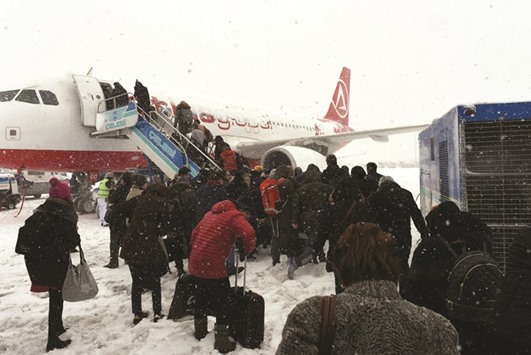A cold snap gripping Europe has killed more than 30 people in recent days, left thousands of travellers stranded in snow-covered Turkey and brought fresh misery for migrants and the homeless.
The double-digit sub-zero temperatures hit Poland particularly hard, with the mercury plummeting below -20° Celsius (-4° Fahrenheit) in some regions.
Sunday was the country’s worst 24 hours so far for cold-related deaths.
“Yesterday, 10 people died of cold,” Poland’s centre for national security (RCB) said yesterday in a statement, adding to the same number of fatalities over the preceding two days combined.
The number of hypothermia victims has reached 65 since November 1, the centre added, and local authorities issued smog alerts across Poland amid a deep freeze yesterday.
Greece and Italy have also seen fierce cold weather over the past week and in both countries several migrants died of hypothermia.
In Italy’s central and southern regions, schools and factories were forced to close to close as local elections were delayed.
Heavy snowfall and icy conditions caused several towns and cities in the Molise and Puglia regions to postpone local elections as officials urged residents to stay home.
In the central Abruzzo region, a number of factories, including those of the Sevel and Honda carmakers, were closed, while school pupils were forced to stay home in several districts in the southern Calabria, Molise and Puglia.
“We’re calling this phenomenon a thermal anomaly, because temperatures in many central and southern locations are between 10° to 12° C below average,” meteorologist Serena Giacomin from Epson Meteo.it weather service told DPA.
“For Puglia, we’re calling this an exceptional event,” she added.
Italian media reported that eight people have died since Friday due to the sub-zero temperatures, although the Italian government said there had been no deaths confirmed as a result of the cold weather.
More snow is expected in the next 12-18 hours in Abruzzo, along with gale force northerly winds and high waves in the southern regions of Basilicata, Calabria, Campania, Molise, Puglia, and Sicily, according to the Italian Air Force weather service.
The cold front is expected to last until mid-week, according to Meteo.it weather service.
Heavy snowfall in Turkey’s main city Istanbul paralysed traffic for a third straight day while the Bosphorus Strait, one of the world’s busiest shipping bottlenecks, was shut due to poor visibility.
Ferry services between the European and Asian sides of the city were scrapped and schools across the city closed.
Flagship carrier Turkish Airlines said 314 flights were cancelled yesterday, with chief executive Bilal Eksi telling angry passengers that snow had caused a lack of take-off and landing slots at Ataturk airport.
Some international flights were expected to resume after 6pm (1500 GMT), but all domestic flights to and from the airport had been scrapped.
On a normal day, it can handle more than 1,500 landings and take-offs.
Eksi earlier said over 600 flights were cancelled on Sunday and more than 10,000 travellers unable to reach Istanbul had been put up in hotels worldwide.
In the Czech Republic, six people died during the weekend, very probably of hypothermia, four of them freezing to death in Prague, media reports said.
A 68-year-old homeless man was found frozen to death in the Macedonian capital Skopje while in Serbia, the southeastern town of Sjenica saw the mercury plunge to -33° C.
Traffic on the Danube and Sava rivers was halted in Serbia.
Scores of migrants in the capital Belgrade took shelter in a warehouse near the railway station, spurning shelters provided by the government for fear they would be deported back to their countries.
“It’s very difficult, especially at night,” said Niamat, a 13-year-old Afghan.
The temperature overnight was -15° Celsius.
“I have been waiting here for three months and I do not know when I will be able to continue my journey,” said the young migrant, who is travelling alone.
Ismail, aged 16, added: “Nobody is helping us, it’s very cold and I’m worried how we will endure this.”
Schools were closed across cities in central Siberia yesterday but classes resumed in Moscow where the temperature rose by seven degrees to -20° C.
The Russian capital recorded its coldest Orthodox Christmas Night for 120 years at the weekend, according to media reports.
Two people died of hypothermia in Moscow between December 31 and January 9, Russian news agencies reported.
Greece, with more than 60,000 mainly Syrian refugees on its territory, has moved many migrants to prefabricated houses and heated tents.
At the Moria refugee camp on the island of Lesbos, more than 2,500 people are living in tents, without hot water or heating, including women, children and the handicapped, said Apostolos Veizis from the charity Doctors Without Borders.
He said there were more than 300 people in a similar situation on the island of Samos.

People board a plane during snowfall yesterday at Ataturk international airport in Istanbul.
